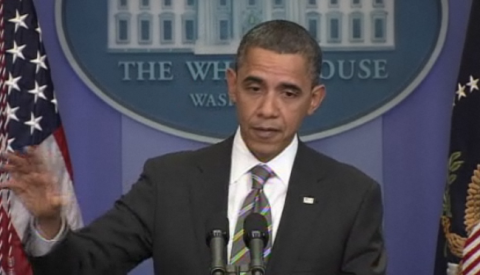Obama's deal

The big political news this week is yesterday's deal
between the White House and Republican leaders: in exchange for extending the
Bush tax cuts for two years and relaxing the estate tax, Obama got a 13-month
extension of unemployment benefits, a one-year payroll tax decrease and some
additional tax credits and breaks.
Wait, tax breaks are what he got in the deal? I thought Democrats loved taxes! Actually,
center-to-left economic thought maintains that in tough economic times, what
you need to do is stimulate the economy--either with government spending or
with tax relief for lower- and middle-income people. (Tea Party slogans
notwithstanding, last year's stimulus bill did
both.) The resulting short-term deficits are okay; you deal with them once times
have improved.
As for unemployment benefits, Tim Fernholz nails
it: "one galling aspect...is that emergency unemployment insurance became a
policy option that had to be bargained for, rather than a given during tough
times," as it was for President Reagan and a Republican Senate in the early
1980s.
John Avlon thinks
Obama could have gotten a better deal if he were a tougher negotiator. Jonathan
Bernstein disagrees,
as
does Steve Benen: "I'm comfortable putting this in the 'better than
expected' category."
I'm on team better-than-expected on this one. I certainly
share Laura Conaway's frustration
with tax cuts for the rich, but her complaint about how much the deal adds to
the deficit is off base. For weeks, deficit cutting has purportedly been at the
top of the agenda, even though the economy has not yet recovered. As David
Leonhardt puts it,
the deal on tax cuts "looks an awful lot like a second stimulus"--which,
despite the White House's hair-splitting denial
of the politically poisonous word, is exactly what we need.
Still, the concessions Obama had to make here are downright
odious. Tax cuts for the rich drive up the deficit while doing virtually
nothing to stimulate the economy--whichever problem is more pressing, this
move doesn't help one and makes the other worse. You might defend these tax
cuts on the ideological grounds that all taxes should always be lower, details
and context be damned; if you're rich you might appreciate the extra money in your
pocket. But these aren't what I'd call morally inspiring positions.
Congressional liberals certainly don't think so, and they may
well refuse to support the deal. If they can get a better
one and pass it, good for them. But Obama deserves credit for a deal that
would stimulate the economy, maintain poverty-fighting tax credits and keep the
unemployed from becoming homeless--negotiated with an opposition party that barely
manages anymore even to feign interest in good-faith compromise, coherent
arguments or the common good. Tax cuts for the rich are the only bargaining
chip the Republicans value these days--and that's their shame, not Obama's.






